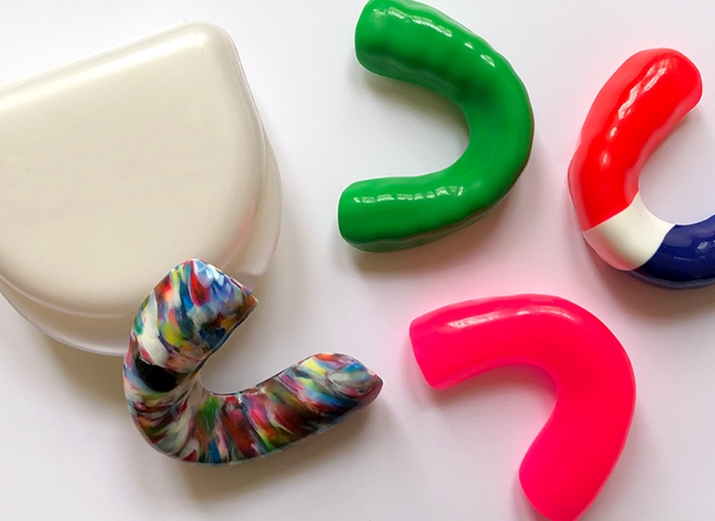
Mouthguard's
Why Wear a Mouthguard?
Every year thousands of children are treated for dental injuries, which could have been prevented, or the severity minimised, by wearing a protective mouthguard.
Anyone who participates in a sport that carries a risk of
contact to the face should wear a mouthguard.
This includes obvious sports such as football, boxing and
rugby, and also collision sports where unexpected contact
often happens. These include basketball, hockey, water
polo, lacrosse, netball, baseball, softball, squash, soccer,
BMX bike riding, horse riding, skateboarding, in-line
skating, trampolining, cricket (wicket keeping or batting
without a helmet), water skiing and snow ski racing.
Why do you need a mouthguard?
A mouthguard helps absorb the shock experienced by
a blow to the face, which might otherwise result in an
injury to the mouth or jaw. A heavy collision can result
in chipped or broken teeth, internal damage to a tooth,
tooth loss, injuries to the soft tissue of the mouth, and, in
severe cases, concussion or a broken jaw.
Injuries like these can lead to long and potentially
expensive treatment to restore teeth and the mouth back
to normal function and appearance.
When should I wear a mouthguard?
Mouthguards should be worn whilst playing and training
for any sport that could involve contact to the face.
Other Mouthguard Tips:
The Australian Dental Association (ADA) recommends
that only a professionally custom-fitted mouthguard
should be worn.
Check your mouthguard every 12 months for optimal
fit and protection.
Keep your mouthguard clean and store it in a rigid
container, away from heat to ensure it maintains its
shape.
What type of Mouthguard Should I Wear?
Wearing a custom-fitted mouthguard while
participating in sport is vitally important to help
prevent dental injuries.
There are many types of mouthguards, from overthe-
counter products to the professionally-fitted
custom guard. The Australian Dental Association
(ADA) recommends that self-fitted, over-the-counter
mouthguards are inadequate and, for effective protection,
a professionally-fitted custom mouthguard is essential.
The lifetime cost of a dental injury justifies the expense
of good protection to prevent the injury in the first place.
Custom-fitted mouthguards:
A custom-fitted mouthguard is made by a dentist using
an impression taken of your teeth and a plaster model.
Custom fitting allows the dentist to accurately assess
your mouth and provide the best fit, size, coverage and
thickness in a mouthguard made especially for you.
The dentist can also make an assessment of any risk
factors you might have and recommend the best type of
mouthguard appropriate for your sport.
Custom-fitted mouthguards are comfortable, allow you to
talk, have maximum resistance against being dislodged
and should not restrict breathing.
Over-the-counter mouthguards
These mouthguards are cheaper than custom-fitted
mouthguards. These include stock mouthguards that have
no fitting at all, and boil and bite mouthguards that are
self fitted by softening them in hot water, inserting them
in the mouth and allowing them to adapt to the shape of
the mouth as they cool and set.
The ADA and Standards Australia do not recommend over
the counter boil and bite mouthguards. They are poorly
fitting and less comfortable to wear because they have
not been specifically fitted to the shape of your mouth
and teeth. This greatly lessens their effectiveness and can
increase the risk of damage to teeth.
Is any sort of mouthguard better than none?
A boil and bite mouthguard may be a short-term choice
if there is absolutely no alternative available, but even
with careful attention to the directions, the best result
is a poorly fitting mouthguard that offers inadequate
protection. Some studies place their degree of protection
only slightly better than wearing no mouthguard at all.
How long will my mouthguard last?
Your dentist should review your mouthguard every
12 months to ensure it fits correctly. Sometimes, a
mouthguard needs to be replaced if major changes occur
to the teeth, like restorations or adult teeth coming
through.
How do I clean my mouthguard?
Mouthguards need to be rinsed in cold water after use,
dried and stored in a plastic container. Mouthguards can
distort under higher temperatures, so they should be kept
in a cool place.
For more information on mouthguards and protecting teeth visit: www.ada.org.au
Reference : Australian Dental Association
There are different types of Custom-fitted mouthguards to suit everyone and every sport.
Single laminated mouthguards:
AFL
Hockey
Karate
Rugby
Double laminated mouthguards:
AFL
Karate
Rugby
Motocross
Judo / Wrestling
Field Hockey
Softball / Baseball
White water rafting
Triple/Heavy laminated mouthguards:
Kick Boxing
Boxing
Rugby League
Ice Hockey
